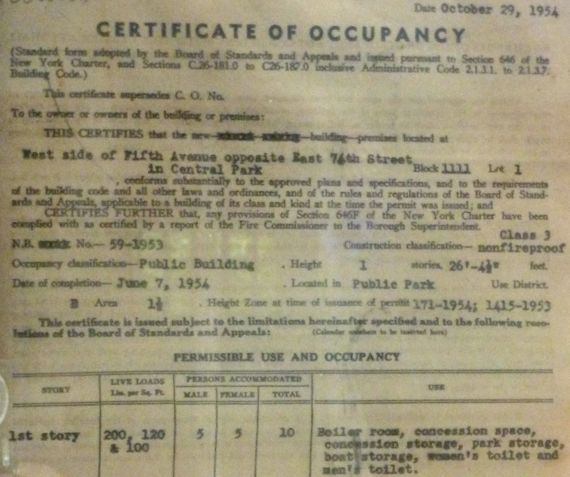Language whine
Wednesday, 14 July 2010

I got such good material last week in NYC, I just had to use one more New York Snap. This is from the famous boat house in Central Park. Actually, it’s not the “boathouse” where you rent—I kid you not—”excursion crafts (row boats),” but the building where you can keep and refurbish your model sailboat—just sign up on the list on the bulletin board inside. Then, take your boat-treasure right out across the apron and set it afloat on the “Conservatory Water“—don’t get me started on that name! Anyway, this is the building’s carefully framed Certificate of Occupancy. Can you see the date in the upper right? 1954. The other thing I found interesting: down at the bottom of this clip: occupancy is limited to 5 male and 5 female. Just how do they figure that?
Some definitions:
Profane means non-sacred or outside the temple—thus, irreverent or blasphemous. The term is also used for general verbal expressions that sound or are intended to sound insulting, rude, or disrespectful.
To blaspheme is to speak irreverently about sacred or holy things (apologies for the circularity). Blasphemy has a religious component. Some countries ban blaspheming.
Obscene means outside the standards of decency and morality, and often is applied to sexual matters. What is obscene is contextual. And good luck with a universal distinction between obscenity and indecency.
Curses, strictly speaking (haha), invoke supernatural power to inflict harm or punishment on someone or something. Cuss is an informal version of the word, in this context.
Swearing is to make a solemn statement; it’s also to use offensive language, often in anger.
Vulgarity is an indecorous expression specifically chosen for its unrefined character; it generally has a social and moral component, even if casually chosen.
Okay. Now, don’t confuse or blur these!
And note that they don’t all overlap. Remember this when listening to the current hubub about the Supremes’ latest decision on language and broadcasting. And remember that profanity, obscenity, etc. are contextual, both in the moment (who are the speaker and audience? what is conventional for them?) and within the social experiences of the user of the language.
So, “swear words” may be profane, obscene, vulgar, or curses, but rarely are all of them. Most common swear words in the US of A these days are obscene and vulgar. A few are profane and curses; to some, that makes them also vulgar. But, the overwhelming majority users of these words do not think of any of the common swear words as blasphemy—and may not be able to come up with any words they think of as blasphemy. See how complicated it is?